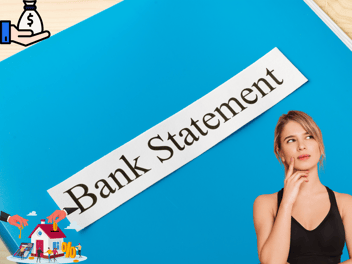5 min read

Introduction
The journey to homeownership can be uniquely challenging for self-employed individuals. Traditional mortgage approval processes are often tailored to those with a regular paycheck, leaving the self-employed to navigate a more complex path. This blog post aims to guide self-employed borrowers through the preparation needed for mortgage approval and explain why their mortgage broker might suggest a bank statement loan as a viable option.
Understanding the Mortgage Landscape for the Self-Employed
The Challenge of Proving Income
The biggest hurdle for self-employed individuals in securing a mortgage is proving income. Traditional lenders typically look for consistent, documented income, usually verified through W-2 forms and pay stubs – documents that self-employed individuals do not have.
The Importance of Creditworthiness and Financial Health
Apart from income, lenders also scrutinize credit scores, debt-to-income ratios, and overall financial health. For the self-employed, maintaining a strong financial profile is crucial for mortgage approval.
Preparing for Mortgage Approval: A Step-by-Step Guide
Step 1: Organize Your Financial Documentation
- Tax Returns: Have at least two years of tax returns available. While these are important, they often don’t tell the whole story of a self-employed individual’s income.
- Profit and Loss Statements: Prepare up-to-date profit and loss statements to show your current business performance.
- Bank Statements: Keep a record of your bank statements, as they can be vital in proving your income through alternative methods like bank statement loans.
Step 2: Improve Your Financial Profile
- Boost Your Credit Score: Pay down debts and ensure your bills are paid on time to improve your credit score.
- Lower Your Debt-to-Income Ratio: Try to minimize outstanding debts. A lower ratio makes you more attractive to lenders.
- Save for a Larger Down Payment: A substantial down payment can sometimes offset the perceived risk of lending to self-employed individuals.
Step 3: Understand Your Income
- Consistency is Key: Show consistent income from your self-employment. Fluctuations can be a red flag for lenders.
- Be Prepared to Explain: Be ready to explain any significant changes or anomalies in your income over the past few years.
Step 4: Seek Professional Advice
- Consult a Mortgage Broker: A broker experienced in self-employed mortgages can provide invaluable advice and guide you to the right lenders.
- Accountant Consultation: An accountant can help ensure your financial documentation accurately reflects your income and financial health.
The Role of Bank Statement Loans
What is a Bank Statement Loan?
A bank statement loan is a type of mortgage where lenders use your bank statements, typically from the last 12 to 24 months, to assess your income instead of traditional income verification methods.
Why Might a Mortgage Broker Suggest This?
- Alternative Income Verification: For self-employed individuals who have healthy cash flows not reflected in tax returns, bank statement loans offer an alternative path to proving income.
- Flexibility: These loans are more flexible regarding the types of income accepted and can be tailored to the unique situations of self-employed borrowers.
- Higher Approval Chances: By focusing on cash flow rather than taxable income, self-employed individuals may have a higher chance of approval.
Best Practices for Securing a Bank Statement Loan
Choose the Right Lender
Not all lenders offer bank statement loans, and terms can vary significantly. Find a lender experienced in dealing with self-employed borrowers.
Prepare Your Bank Statements
Ensure your bank statements are in order, showing consistent income and healthy cash flow. Avoid overdrafts or unusual transactions in the months leading up to your mortgage application.
Understand the Terms
Bank statement loans can have different terms, including interest rates and down payments. Make sure you fully understand these before proceeding.

Case Studies: Success with Bank Statement Loans
The Freelancer
A freelance graphic designer struggled to secure a traditional mortgage due to variable income. By using a bank statement loan, she was able to use her consistent bank deposits to qualify for a mortgage.
The Small Business Owner
A small business owner’s tax returns showed limited income due to deductions. A bank statement loan allowed him to leverage his actual business cash flow to secure a mortgage.
Conclusion
For self-employed individuals, preparing for a mortgage involves careful financial planning and a thorough understanding of alternative lending options like bank statement loans. By organizing financial documents, improving financial health, and seeking professional advice, self-employed borrowers can enhance their chances of mortgage approval. Bank statement loans emerge as a practical solution, offering a more flexible approach to income verification and a higher likelihood of approval for self-employed borrowers.
FAQ Section About Bank Statement Loans
Q: How long do I need to be self-employed to qualify for a bank statement loan? A: Typically, lenders require at least two years of self-employment history to qualify for a bank statement loan.
Q: Are the interest rates for bank statement loans higher than traditional mortgages? A: Yes, bank statement loans often come with slightly higher interest rates due to the perceived increased risk.
Q: Can I qualify for a bank statement loan with a low credit score? A: It’s possible, but a lower credit score may affect the terms of the loan. Some lenders specialize in bank statement loans for borrowers with lower credit scores.
Q: Do all lenders offer bank statement loans? A: No, not all lenders offer these types of loans. It’s important to find lenders that provide bank statement loan programs.
Q: What types of bank statements are required for these loans? A: Lenders typically require personal and/or business bank statements for the last 12 to 24 months. The specific requirements can vary depending on the lender and the borrower’s business structure.

Table of Content

Take your pick of loans
Experience a clear, stress-free loan process with personalized service and expert guidance.
Get a quote


